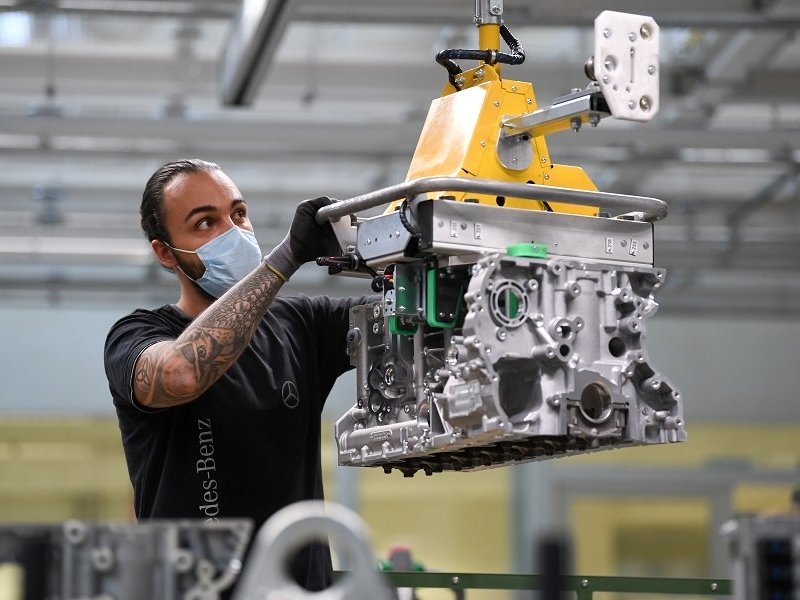
MUNICH — BMW and Volkswagen are among European automakers rebooting their car factories to take advantage of easing coronavirus lockdown rules.
VW restarted production at its home plant in Wolfsburg on Monday, while BMW is cranking up engine manufacturing, also starting Monday.
BMW, VW and Daimler, are banking on Germany’s ability to trace and contain the coronavirus, and a healthcare system capable of extensive testing to identify possible carriers of the disease.
Production capacity in the Wolfsburg plant will be at around 10 per cent to 15 percent to begin with, and reach around 40 percent of pre-crisis levels in the week after, said Andreas Tostmann, VW brand’s board member responsible for production.
“The restart of Europe’s biggest car factory after weeks of standstill is an important symbol for our employees, our dealers, suppliers, the German economy and for Europe,” Tostmann said.
VW builds the Golf compact hatchback in Wolfsburg. This week 1,400 cars will be built, followed by 6,000 cars in a fortnight, VW said.
VW has overhauled its procedures to include extra hygiene measures. Workers are told to measure their temperature and to get changed into their overalls at home, to prevent crowding in factory changing rooms. Extra markings have been put on the factory floor so that workers are better able to adhere to a 1.5 meter social distancing rule, and extra time is provided so that employees can disinfect their tools and surfaces, VW said.
VW resumed production of its battery-powered ID3 hatchback on Thursday. Deliveries of the ID3 are due to start in Europe in the summer. It’s a key launch for VW as the first vehicle in its new generation of affordable, long-range electric cars. The automaker’s factory in Bratislava, which builds Porsche, VW and Audi large utility vehicles and minicars, also reopened on Thursday.
Encouraged by a fall in infection rates, Germany has allowed small retail stores, including car dealerships, to reopen, provided they adhere to strict distancing and hygiene rules. VW said about 70 percent of its dealerships in Germany had re-opened.
VW’s other plants in Germany and in Portugal, Spain, and Russia will restart production after April 27, the automaker said in a news release. Its U.S. plant in Tennessee is scheduled to re-open May 3.Through May, production will be resumed successively in South Africa, Argentina, Brazil and Mexico, VW said.
BMW aims to reopen its factory building Rolls-Royce cars in Goodwood, England, on May 4, and resume production at its U.S. plant in Spartanburg, South Carolina, which builds utility vehicles for global markets, on the same day.
BMW plans to restart output at its biggest European plant in Dingolfing, Germany, and in San Luis Potosi, Mexico, on May 11.
The automaker’s German plants in Munich, Leipzig and Regensburg will open after May 18, as will the company’s factory that builds Mini cars in Oxford, England.
“The exact dates for the restart will depend on the development in the markets and customer demand,” a BMW spokesperson said.
BMW’s factory in Shenyang, China, has been producing since Feb. 17.
BMW will initially start production at the plants with one shift. Normally, the plants work in two or three shifts. To protect the employees, hygiene and distance regulations are established and processes are reorganized.
Workers need to wear masks and keep a distance to one another. The seating order on BMW factory buses has been changed, as has the process for entering and exiting the bus.
Workers need to come to the plant already wearing their factory clothes, to avoid time stuck in changing rooms, and designated pathways in the plant have been altered to ensure there is “one-way” traffic only, BMW said.
Daimler’s Mercedes-Benz German plants in Sindelfingen and Bremen are also making preparations to ramp up production.
Unlike Italy and Spain, Germany never banned car production, though factories came to a standstill after authorities restricted the movement of people and ordered the closure of car dealerships, hitting demand.
Fiat Chrysler Automobiles will restart van production at its Sevel plant in central Italy on Monday, with plans to resume production at a rate of between 70 percent to 80 percent. The automaker also aims to resume output of new plug-in hybrid versions of the Jeep Compass and Renegade at its factory in Melfi, southern Italy, starting Monday.
In France, Toyota has restarted its assembly plant in Valenciennes.
Renault aims to resume output on April 28 at its factory in Flins, France, where it builds the Renault Zoe electric small car and the Nissan Micra small hatchback.
PSA Group is not saying when it will reopen European factories. The maker of Peugeot, Citroen and Opel automobiles said there is no point in building up inventories while sales are dormant.
“It’s important to have dealership and sales activity before we push the button,” Chief Financial Officer Philippe de Rovira told analysts.
Nissan plans to restart production at its Barcelona factory starting on May 4 and is piloting safety measures at its plant in Sunderland, England.
Sweden’s Volvo Cars reopened its Torslanda factory on April 20 after overhauling its production processes. “The economy has come to a halt in Europe. A vaccine will take a long long time. It is important to restart in a safe way. Hopefully we can contribute to a normalization,” Volvo CEO Hakan Samuelsson said.
Reuters and Bloomberg contributed to this report.